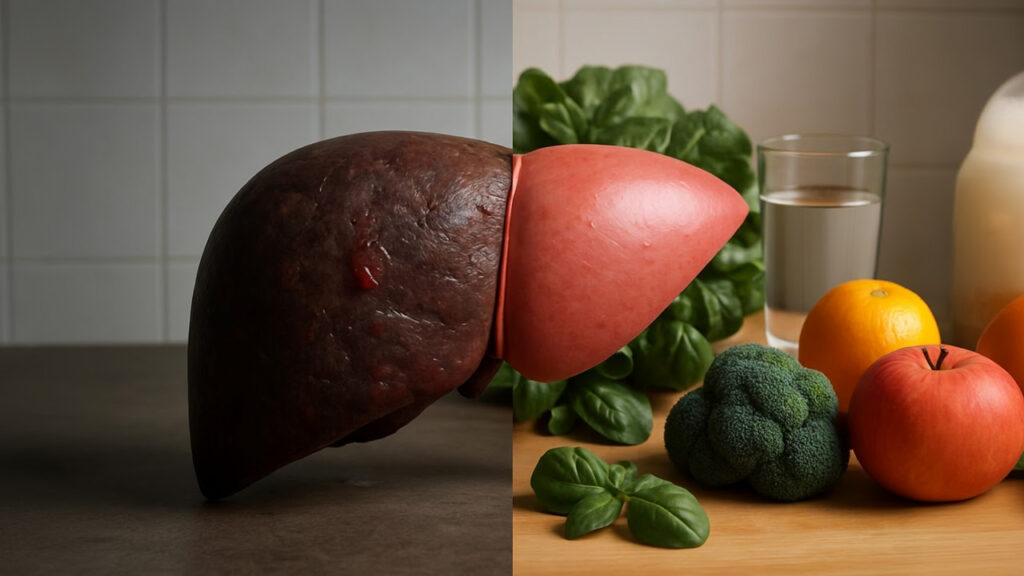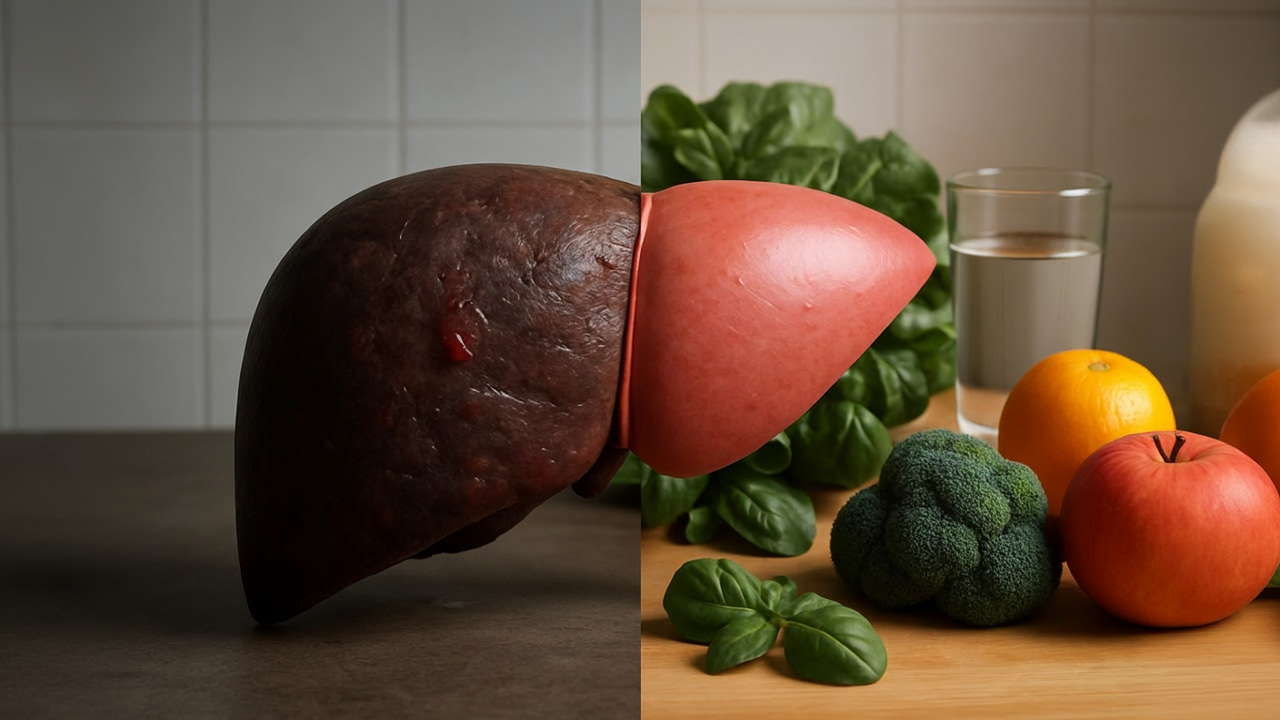Daily Habits That Quietly Destroy Your Liver (And What to Do Instead)
I always thought I was doing everything right — eating “pretty healthy,” staying active, and avoiding fast food. But I was unknowingly doing things every single day that were silently damaging my liver. And when your liver is stressed, it shows up in stubborn fat, low energy, bloating, hormonal issues, and so much more.
Once I started to pay attention to these quiet liver-damaging habits, and replaced them with supportive ones, my body finally started to cooperate — and the results felt effortless.
Let me share what I learned the hard way, so you don’t have to go through the same frustration.

Table of Contents
1. Skipping Breakfast
I used to think skipping breakfast helped me burn more fat. But in reality, it put stress on my liver and blood sugar. The liver stores glycogen (your energy fuel), and when it’s empty for too long, it triggers stress hormones. That’s not fat-burning — it’s metabolic confusion.
What I do instead: I now start my mornings with protein, healthy fats, and fiber. Something like eggs with avocado or a liver-supporting smoothie with chia and berries.
2. Eating Too Close to Bedtime
Late-night snacking was a guilty habit. But the liver does most of its repair and detox work between 1 AM and 3 AM, and eating right before bed disrupts that. It forces the liver to digest instead of cleanse.
What I do instead: I aim to stop eating by 7:30 PM. Giving my liver a break overnight has helped with sleep, bloating, and belly fat.
3. Taking Painkillers Too Often
I used to pop ibuprofen or acetaminophen without thinking. What I didn’t realize is that these meds are processed by the liver, and overuse can quietly build up toxicity.
What I do instead: I now use natural anti-inflammatories like turmeric and magnesium, and I listen to my body instead of silencing it.
4. Drinking Too Little Water
I thought I was hydrated… until I actually measured my intake. When your liver is dehydrated, it can’t flush toxins, and your fat loss stalls.
What I do instead: I now drink warm lemon water in the morning, and at least 2 liters of clean water daily with a pinch of sea salt for electrolyte balance.
5. Holding in Emotions
This one shocked me. Repressed emotions — especially anger — are linked to liver stagnation in traditional Chinese medicine. I never realized how much emotional stress could physically weigh me down.
What I do instead: I journal, pray, and give myself space to process instead of bottling things up. Emotional detox is just as important as physical detox.
6. Eating Too Much Sugar
Even “healthy” sugars from fruit juices and protein bars were overloading my liver. Sugar converts to fat in the liver — especially fructose.
What I do instead: I read labels. I avoid added sugars and opt for whole fruit. My sweet cravings dropped dramatically after supporting my liver with this:
This natural supplement helped me reset
7. Not Getting Enough Sleep
Sleep isn’t just for rest — it’s for repair. When I stayed up late scrolling, my liver paid the price. Without quality sleep, your liver can’t metabolize fat or process hormones properly.
What I do instead: I protect my sleep like it’s sacred. Dark room, early wind-down, and no screens past 9 PM.
8. Ignoring Bloating and Fatigue
I used to think bloating and tiredness were normal. But those are signs the liver is struggling. Don’t ignore the whispers before they turn into screams.
What I do instead: I listen to my body. If I feel sluggish, I simplify my meals, hydrate, and always go back to supporting my liver first.
9. Overeating “Healthy” Foods
Even too much of a good thing can burden your liver. Nuts, protein shakes, even veggies — if your digestion is slow, your liver ends up doing extra work.
What I do instead: I eat mindfully and give my digestive system breaks. I also added this supplement that supports liver enzymes and detox pathways.
10. Thinking Exercise Alone Is Enough
This was a tough one. I believed that as long as I worked out, I could “burn off” anything. But your liver can only burn fat if it’s healthy. Inflammation blocks that process.
What I do instead: I still move my body, but I now make liver health my priority. That’s what unlocks fat loss — not just sweat.
Final Thoughts
Most of us are unintentionally hurting our liver with little daily habits. But the good news is, you don’t need a full life overhaul to turn things around. Just a few simple changes — and a little liver love — can make a huge difference.
Here’s the supplement I added to my routine. It’s gentle, effective, and backed by ingredients I trust.
Once I stopped unknowingly attacking my liver and started supporting it, everything changed: less bloating, more energy, and real, visible fat loss.
One habit I didn’t even think about was eating while stressed or rushed. When you eat in fight-or-flight mode, digestion slows down, and your liver struggles to process nutrients and toxins efficiently. I used to eat meals standing up or scrolling my phone, and I never realized how that was impacting my body.
What I do instead: I take a few deep breaths before eating, sit down, chew slowly, and stay present. This tiny shift improved my digestion and made me feel lighter after meals.
Another sneaky habit was drinking coffee on an empty stomach. I love coffee, but when I drank it first thing in the morning without food or water, it spiked my stress hormones and taxed my liver. It made me jittery and bloated.
What I do instead: I hydrate first thing in the morning and eat a small meal before coffee. And when I need more support, I reach for this supplement to help my liver bounce back.
I also underestimated the impact of inhaled toxins. From scented candles to cleaning sprays and even the air fresheners in my car — these small exposures build up. And it’s the liver’s job to filter all of it.
What I do instead: I now use natural cleaners, open windows daily, and swapped my synthetic candles for essential oil diffusers. Every little bit of reduced exposure helps.
Believe it or not, sitting too long affects liver health too. Sedentary behavior slows circulation, metabolism, and detox function. I used to sit at my desk for hours without moving, and I’d feel puffy and drained.
What I do instead: I set a reminder to stretch or walk every hour. Even five minutes of movement gets my blood flowing and keeps my liver supported.
Another thing I didn’t realize? Too much protein powder. While protein is essential, many powders have artificial ingredients, sugar alcohols, and additives that make the liver work overtime.
What I do instead: I use clean, plant-based protein only when needed — and I focus more on whole foods to give my liver a break.
And let’s talk about alcohol, even just “a little.” I used to think one glass of wine a night was harmless. But alcohol, even in small amounts, forces the liver to pause fat-burning in order to process the drink. Over time, it builds up fat in the liver — quietly.
What I do instead: I limit alcohol to special occasions, and when I do have it, I hydrate heavily and take liver-supporting nutrients the day before and after.
Lastly, I didn’t understand how important gut health is to liver health. If your gut is inflamed or leaking, your liver gets overwhelmed trying to filter out what your gut didn’t. That’s a hidden source of chronic liver stress.
What I do instead: I added probiotics, cut back on gluten and dairy, and focused on liver-friendly foods like bitter greens, beets, and turmeric.
What made all these changes doable — and powerful — was pairing them with this liver support supplement. I started small and added it to my morning routine. The shift in my energy, digestion, and cravings was undeniable.
My message is simple: you don’t need to be perfect. But your liver is quietly keeping score of your habits — and it deserves more support than we usually give it.

